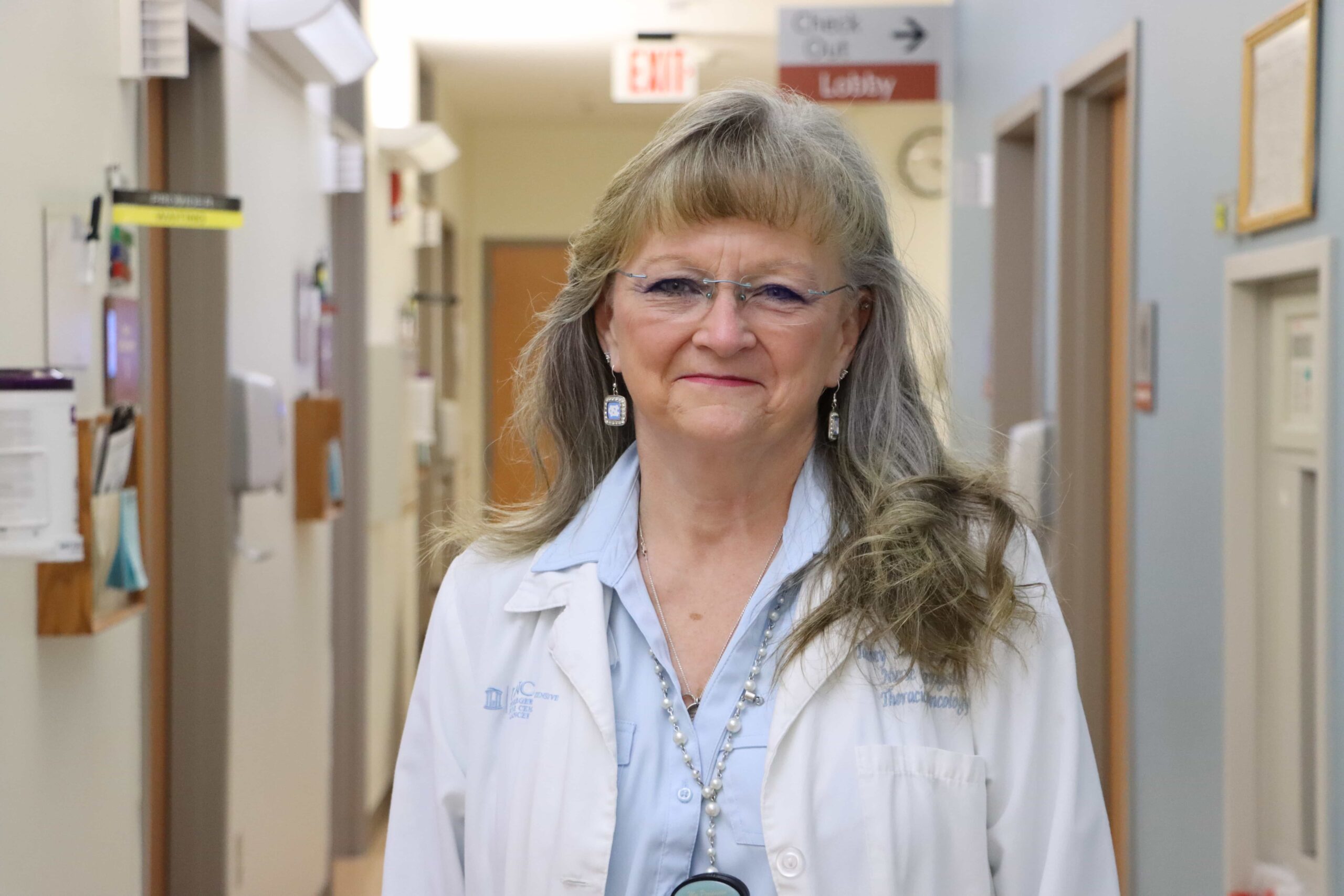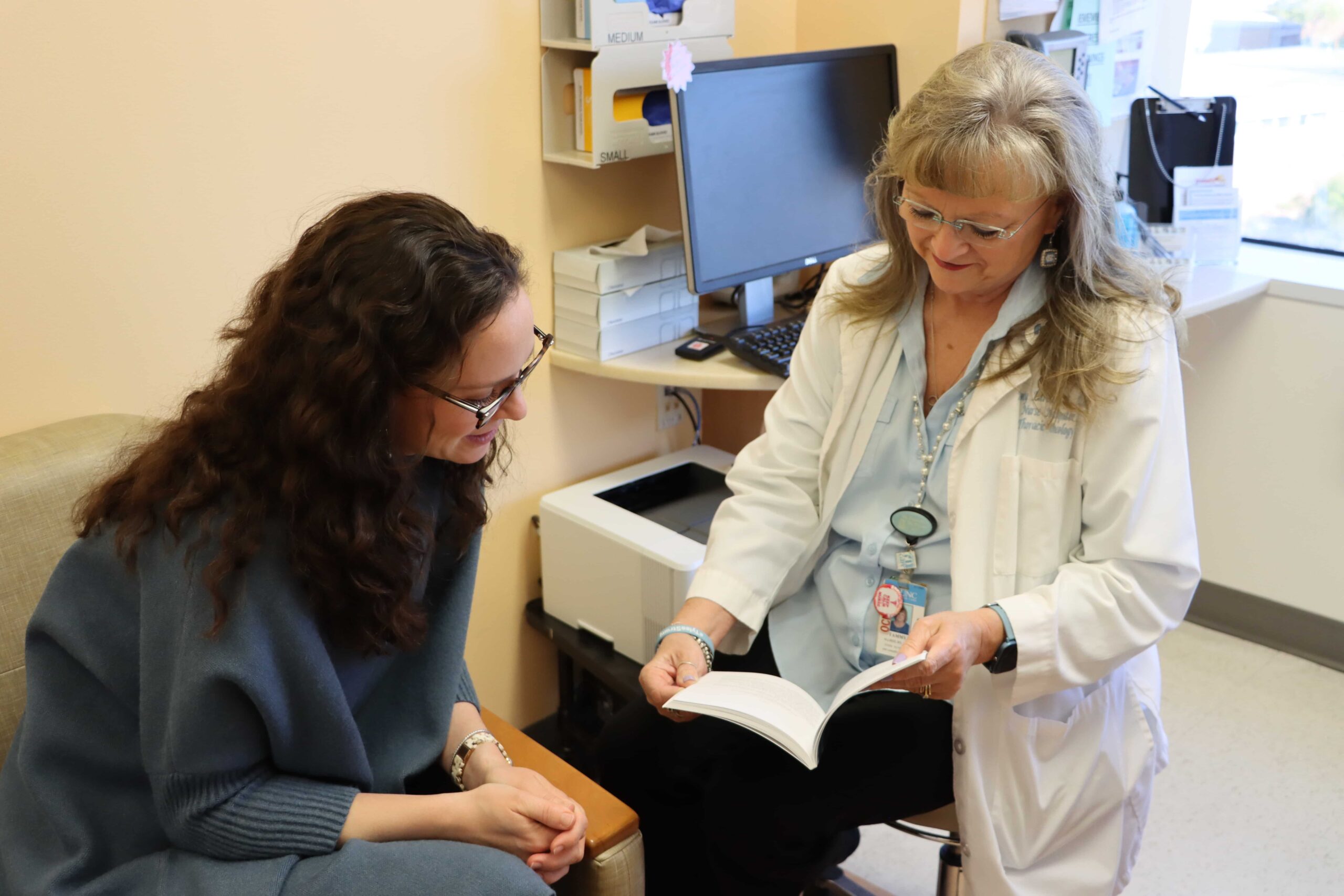
From working on a dairy farm with her father to getting a nursing degree, Tammy Allred, RN, a thoracic oncology nurse navigator, knew early in life that she wanted to be a nurse so that she could help others.
Allred has been at UNC for more than 22 years and her compassion for her patients has never wavered, telling them she would be their “lighthouse to guide them through the storm that is cancer.”
Here’s a few minutes with Tammy Allred, RN.
Tell us about your career journey
I always wanted to be a nurse from the time I was little – it never changed! I have always loved helping others and making a difference in someone’s journey. From my earliest childhood memories, the medical field drew me in and nursing was always the central part of it.
I graduated in 1985 and went to work on a med surg unit that was in the process of changing into the oncology unit. I had no clue other than it scared me to death at the thought of facing this journey that these patients were facing. I obtained my chemo certification and we started giving chemo while people were in the hospital – there was no outpatient chemo center then.
After several years, they built the first medical oncologist office with radiation and chemotherapy on site. We took rotations between chemo, radiation and hospice. I loved it because I met patients from diagnosis, and many times I was their hospice nurse to help them transition over. It was the most rewarding experience and it started my drive to be in oncology.
After a few years, I had my daughter and decided to work in long term care facility so I did not have to work nights and weekends. But my heart kept pulling me back to hospice, so I worked as needed with the local hospice agency all while working in long term care facilities. I did this for about 14 years and then had the option to come to UNC and work in oncology. That is where I was happiest! I worked in the old Gravely Building for many years until going into research at UNC Lineberger. I worked with liquid cancers for a while and then transitioned over to thoracic – where I felt like I really needed to be.
Why did you decide to pursue a career as a nurse navigator, in particular for the thoracic/lung program?
When I learned about oncology nurse navigation, that really drew me in. I would again be with patients from the beginning of their diagnosis all the way through the spectrum of their care. And as a navigator, I would be their “lighthouse in the storm.”
Several patients asked what a navigator really is, and the only explanation I could think of was that I was the lighthouse guiding them through the storm of cancer. They were the ship, and their family was on their ship with them, so we treat that “ship” and get them safely through this storm of treatments, side effects and changes, and made sure that they come through this never alone.
There are lots of challenges and fear, but they know to reach out and we will guide them through this. I get more from my patients than I could ever give to them. But I will always be there for them no matter what.
 What does your day-to-day look like?
What does your day-to-day look like?
There is not one day that is the same. It is ever changing and never boring! When in clinic, I work with the providers and see all new patients. I also see returning patients if they are having any issues.
When I see new patients, I introduce myself and spend time with them reviewing what they know about their diagnosis and try to dispel any myths that they may have heard over time. And one of the biggest things I try to instill into patients is that “Dr. Google” is not a reliable source of information, nor is Facebook. There is no herbal cure for cancer, and if there was, we would be giving that treatment out without delay.
Why is serving this patient population important to you?
I feel the lung cancer population is like the underdog of cancers, and I have always been drawn to the persons who need help the most.
The stigma that has been put on the lung cancer population needs to change. Lung cancer is not a sexy cancer like breast cancer and is it not just a smoker’s disease. It is far from that! If you have lungs, you are at risk! My youngest patient was 19 and the oldest was 99 but from varied risks to no risks.
With the help of the NC Lung Cancer Initiative, we have made great strides in fighting the stigma and changing the face of lung cancer. Just like other cancers, no one deserves it. The changes in the treatments have been mind-blowing over the past 35 years. We still have a way to go, but with research, we are getting there.
What is your most memorable moment with a patient?
I was 20 years old and on my way to the beach for vacation with my husband. However, there was an emergency visit request not far from me, so I told the director I would go since it was on my way out of town and we were short staffed. The patient was 21 years old and dying from esophageal cancer. He was transitioning quickly, and his mom asked for hospice to come urgently.
When we pulled up, the yard was full of Harley Davidson motorcycles. When I went into the home, his mom grabbed me and hugged me tight. She was shaking and so scared of the unknown. Of course, her baby boy was actively passing from cancer. He was in the middle of their front room in a hospital bed that hospice had just brought out. The room surrounding his bed was full of big burly bikers and I had to make my way through this crowd to get to him. The leader yelled to “let the little girl through!” (ha, I still have to giggle about that).
I talked to him and checked him for pain and any issues that needed to be addressed. I asked him if he needed anything, and his response was, “I’m so scared. I don’t know what to do.” I told him try to relax and know he was not alone. To close his eyes and look ahead towards the light.
Each time he closed his eyes, after a bit he would open his eyes and pick someone in the room and tell them what he felt, but always ended it with, “I love you and stay safe.” And each time, he was less scared, appearing more relaxed.
His mom was able to give him permission to let go and that she would be okay, and to send her something to let her know he is near. His pain was well controlled and the last time he opened his eyes, he gave a big smile and told his mom, “I’m home and it is so beautiful. Just know I love you,” and he let go.
There was not a dry eye in that home, including me. So many big burly bikers were there and not one was able to hold back the tears. He died at peace and his mother kept telling me thank you for walking her son over to his forever home. I will never forget that experience and it impacted me forever.
What advice do you have for someone entering this line of work?
If you are interested in becoming a navigator, be sure that you get experience in all areas of cancer care so you are aware how to provide the education to patients correctly. If you have a wide variety of interests in cancer care, then navigation is the place to be. It is not easy but it has to be one of the most rewarding careers that I have ever had.
What was your very first job?
I was raised 10 miles outside of Chapel Hill on a dairy farm. My dad and my uncle took over the farm from my grandfather, and since my dad didn’t have any sons, I helped my daddy at the barn milking cows and feeding calves and whatever else was needed.
Just like nursing, you must pay attention to the animals because they can’t tell you if something is wrong and you have to be in tune to their needs.
When I got my driver’s license, I went to work at Kerr Drugs on the weekends when not in school, but still helped my daddy at the barn.
What helps keeps you motivated?
My patients keep me motivated. Knowing that I may make a small difference in someone’s life, when they need it the most, that gives me motivation to continue on and find ways to make it easier on other patients coming into this fight.
Just being nice to someone can make a difference, but being there when someone is in their darkest hours facing uncertainty is what keeps me going and fulfills my life as well.
